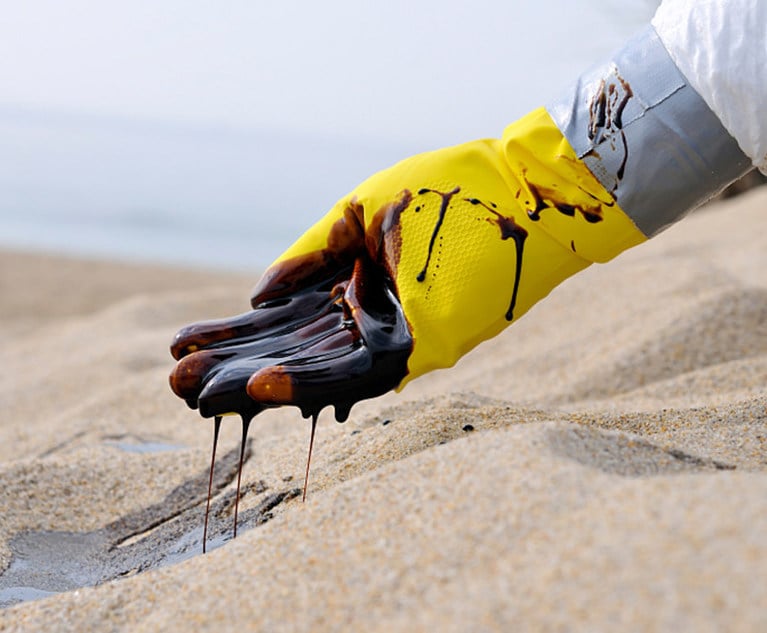Maritime Law Column: The Legacy of the Oil Pollution Act of 1990
"Oil spills in U.S. waters have decreased in both number and volume since OPA's enactment, though major incidents still occur from time to time," writes columnist Keith Letourneau.
February 01, 2024 at 10:00 AM
7 minute read
Cargo and Shipping In 1989, the tanker Exxon Valdez grounded on Bligh Reef, Alaska resulting in the spill of more than 11 million gallons of oil into Prince William Sound. The resulting ecological disaster galvanized Congress to enact the Oil Pollution Act the next year. This legislation has had far-reaching implications for the carriage of oil by ship, enforcement actions against responsible parties, funding to respond to spills nationwide, and the protection of the U.S. marine environment.
In 1989, the tanker Exxon Valdez grounded on Bligh Reef, Alaska resulting in the spill of more than 11 million gallons of oil into Prince William Sound. The resulting ecological disaster galvanized Congress to enact the Oil Pollution Act the next year. This legislation has had far-reaching implications for the carriage of oil by ship, enforcement actions against responsible parties, funding to respond to spills nationwide, and the protection of the U.S. marine environment.
Before OPA, single-hulled tankers carried oil to, from and between U.S. ports. OPA phased in the transition to double-hull tankers, which have become the norm worldwide. In 1992, the International Maritime Organization (IMO) modified the International Convention for the Prevention of Pollution by Ships (MARPOL) to phase in and extend the double-hull requirement globally. Studies show that depending on the impact speed, double hulls can reduce the likelihood of a pollution incident by more than 60% compared to single-hull tankers. While double-hull tankers are not a panacea to stop oil discharges at sea, they provide greater protection from pollution incidents caused by groundings, or low-speed/low-impact collisions. By way of example, in 2009, the double-hull tanker SKS Satilla allided with a submerged oil rig in the Gulf of Mexico creating a huge gash in the vessel's outer hull, but no oil spilled. In 2021, a tug collided with the tanker Polar Endeavor in Valdez, Alaska tearing a four-foot hole in the outer hull, but no oil spilled; the inner hull remained intact. On the downside, double-hulled tankers are more expensive to build and maintain and may be less stable due to a higher center of gravity and greater free-surface effect in the ballast tanks.
Under OPA, the "Responsible Party" or RP is strictly liable for an oil spill, though it may seek contribution or indemnity from other culpable parties. OPA requires the RP to immediately respond to a pollution incident by deploying an oil spill response organization (OSRO) to clean it up, failing which the U.S. Coast Guard (USCG) may take over the spill response and manage the operation at the RP's expense. One of the compromises that led to the passage of OPA is that cargo owners are not liable for a pollution discharge, though a variety of states also have imposed strict liability on the cargo owner in the event of a pollution discharge.
This content has been archived. It is available through our partners, LexisNexis® and Bloomberg Law.
To view this content, please continue to their sites.
Not a Lexis Subscriber?
Subscribe Now
Not a Bloomberg Law Subscriber?
Subscribe Now
NOT FOR REPRINT
© 2025 ALM Global, LLC, All Rights Reserved. Request academic re-use from www.copyright.com. All other uses, submit a request to [email protected]. For more information visit Asset & Logo Licensing.
You Might Like
View All
Maritime Law Column: When Is a Contract Maritime and Why Is That Important?
7 minute read

Maritime Law Column: Texas Maritime Public Infrastructure Projects to Watch
6 minute readLaw Firms Mentioned
Trending Stories
- 1Uber Files RICO Suit Against Plaintiff-Side Firms Alleging Fraudulent Injury Claims
- 2The Law Firm Disrupted: Scrutinizing the Elephant More Than the Mouse
- 3Inherent Diminished Value Damages Unavailable to 3rd-Party Claimants, Court Says
- 4Pa. Defense Firm Sued by Client Over Ex-Eagles Player's $43.5M Med Mal Win
- 5Losses Mount at Morris Manning, but Departing Ex-Chair Stays Bullish About His Old Firm's Future
Who Got The Work
J. Brugh Lower of Gibbons has entered an appearance for industrial equipment supplier Devco Corporation in a pending trademark infringement lawsuit. The suit, accusing the defendant of selling knock-off Graco products, was filed Dec. 18 in New Jersey District Court by Rivkin Radler on behalf of Graco Inc. and Graco Minnesota. The case, assigned to U.S. District Judge Zahid N. Quraishi, is 3:24-cv-11294, Graco Inc. et al v. Devco Corporation.
Who Got The Work
Rebecca Maller-Stein and Kent A. Yalowitz of Arnold & Porter Kaye Scholer have entered their appearances for Hanaco Venture Capital and its executives, Lior Prosor and David Frankel, in a pending securities lawsuit. The action, filed on Dec. 24 in New York Southern District Court by Zell, Aron & Co. on behalf of Goldeneye Advisors, accuses the defendants of negligently and fraudulently managing the plaintiff's $1 million investment. The case, assigned to U.S. District Judge Vernon S. Broderick, is 1:24-cv-09918, Goldeneye Advisors, LLC v. Hanaco Venture Capital, Ltd. et al.
Who Got The Work
Attorneys from A&O Shearman has stepped in as defense counsel for Toronto-Dominion Bank and other defendants in a pending securities class action. The suit, filed Dec. 11 in New York Southern District Court by Bleichmar Fonti & Auld, accuses the defendants of concealing the bank's 'pervasive' deficiencies in regards to its compliance with the Bank Secrecy Act and the quality of its anti-money laundering controls. The case, assigned to U.S. District Judge Arun Subramanian, is 1:24-cv-09445, Gonzalez v. The Toronto-Dominion Bank et al.
Who Got The Work
Crown Castle International, a Pennsylvania company providing shared communications infrastructure, has turned to Luke D. Wolf of Gordon Rees Scully Mansukhani to fend off a pending breach-of-contract lawsuit. The court action, filed Nov. 25 in Michigan Eastern District Court by Hooper Hathaway PC on behalf of The Town Residences LLC, accuses Crown Castle of failing to transfer approximately $30,000 in utility payments from T-Mobile in breach of a roof-top lease and assignment agreement. The case, assigned to U.S. District Judge Susan K. Declercq, is 2:24-cv-13131, The Town Residences LLC v. T-Mobile US, Inc. et al.
Who Got The Work
Wilfred P. Coronato and Daniel M. Schwartz of McCarter & English have stepped in as defense counsel to Electrolux Home Products Inc. in a pending product liability lawsuit. The court action, filed Nov. 26 in New York Eastern District Court by Poulos Lopiccolo PC and Nagel Rice LLP on behalf of David Stern, alleges that the defendant's refrigerators’ drawers and shelving repeatedly break and fall apart within months after purchase. The case, assigned to U.S. District Judge Joan M. Azrack, is 2:24-cv-08204, Stern v. Electrolux Home Products, Inc.
Featured Firms
Law Offices of Gary Martin Hays & Associates, P.C.
(470) 294-1674
Law Offices of Mark E. Salomone
(857) 444-6468
Smith & Hassler
(713) 739-1250







